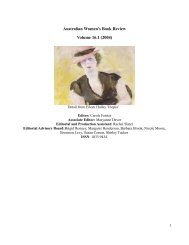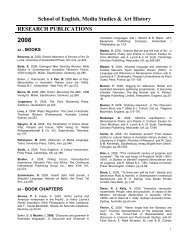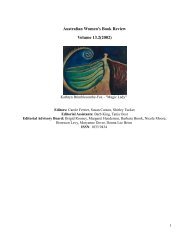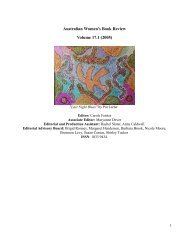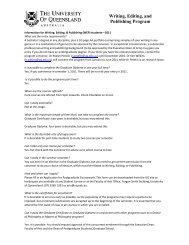Australian Women's Book Review Volume 14.1 - School of English ...
Australian Women's Book Review Volume 14.1 - School of English ...
Australian Women's Book Review Volume 14.1 - School of English ...
You also want an ePaper? Increase the reach of your titles
YUMPU automatically turns print PDFs into web optimized ePapers that Google loves.
found as the reality <strong>of</strong> her American opportunity. With this story would have come a multitude <strong>of</strong><br />
female others, obscured by the fortunate lifestyle makeover narrative that underscores masculinised<br />
ideological constructions <strong>of</strong> migrant experience in America. They are promised by Pybus in her<br />
detailing <strong>of</strong> how women migrants were 'processed' at Ellis Island, and thus established as essentially<br />
other to the American dream, as they were stripped down and probed for deficiencies in language,<br />
body, and mind. Such would have been Lillian's entry point into the country, as it was into Pybus's<br />
story. In both settings, Lillian stood as representative <strong>of</strong> thousands who looked over their shoulders<br />
back to home when they no longer recognized themselves in the culture that dominated them. It struck<br />
a chord with me, living in Australia, watching Rabbit-Pro<strong>of</strong> Fence, recalling writers like Nugi<br />
Garimara, Labumore, Glenyse Ward, and Monica Clare, and wondering where Pybus might have taken<br />
her trip if she had had a bit more empathy, and a lot less sympathy. An impossible demand perhaps,<br />
given that the bourgeois woman engaging in confessional narrative to affirm a ready-made worldview<br />
travels an altogether separate path.<br />
Even as I yearned for Raven Road to go much further with the connective histories <strong>of</strong> women displaced<br />
from their homelands, and make Lillian and Pybus both representations <strong>of</strong> the recuperative power <strong>of</strong><br />
storytelling, I also acknowledged the vast differences that assured their inevitable estrangement. There<br />
was no way, according to sources cited by Pybus, that Lillian could have got across the Yukon on foot,<br />
let alone over the Baring Strait to Siberia. Yet the doubt, 'or could she?' that drives Pybus's writing is<br />
somewhat subsumed within the more immediate frictions played out by Pybus with her (former) friend<br />
and driver, Gerry. Lillian tends to slip out <strong>of</strong> the historical centre yet again, just as Gerry eventually<br />
ends up driving <strong>of</strong>f and leaving Pybus to the more accommodating company <strong>of</strong> proper strangers.<br />
Through the bulk <strong>of</strong> the text that precedes this parting, however, Pybus points out the contrasts between<br />
her worldview and that <strong>of</strong> Gerry, where the non-academic traveler is constructed as unsophisticated,<br />
bulimic, and self-deprecating. Somehow Lillian's presence emerges out <strong>of</strong> this projection to emphasise<br />
the differences between a journey undertaken in desperation and terror, and one made as a romantic<br />
quest for self-affirmation where class and home advantage ensure a perpetual safety net.<br />
When it does not pr<strong>of</strong>ess to be revising history, or recuperating the story <strong>of</strong> a woman who was clearly<br />
from an entirely different world, this confessional mode <strong>of</strong> storytelling is, as Pybus says, 'frank and<br />
funny.' Appropriating into such narrative the stories <strong>of</strong> women who risk their health, their safety, and<br />
their lives because they hope for a better future seems from a left political standpoint, rather sad. Pybus<br />
undertook her adventure in subarctic wilderness with the aid <strong>of</strong> a large research grant, a Nissan<br />
Pathfinder chauffeured by Gerry, a selection <strong>of</strong> gourmet food items, some earnest librarians in<br />
Tasmania, New York and Vancouver, and a doting husband hanging by the telephone back home in<br />
Tasmania (The irony <strong>of</strong> the presence <strong>of</strong> these props emerges clearly but, it seems, unprompted by the<br />
narration.) Pybus charted a course through Canada to Alaska in pursuit <strong>of</strong> 'the truth' about Lillian. The<br />
resulting Raven Road is a series <strong>of</strong> journal entries turned chapters that are sometimes reflective <strong>of</strong> the<br />
process <strong>of</strong> working as a historian with a factually flawed archive on a historical figure with<br />
comparatively low cultural exchange value. It is more <strong>of</strong>ten, however, an account <strong>of</strong> the baggage<br />
(intellectual, personal) that goes with anyone into a research project, and how the subjectivity <strong>of</strong> the<br />
other emerges laden with that baggage.<br />
Lillian, for instance, was a Polish Jew branded lunatic by the telegraph line workers, police and<br />
reporters who ran across her as she walked across the Yukon and, later, by Pybus who remarks:<br />
The more I try, the less success I have in finding a credible explanation as to why Lillian should seek to<br />
return to Russia. But as I say, the woman was clearly unhinged. (184)<br />
23



